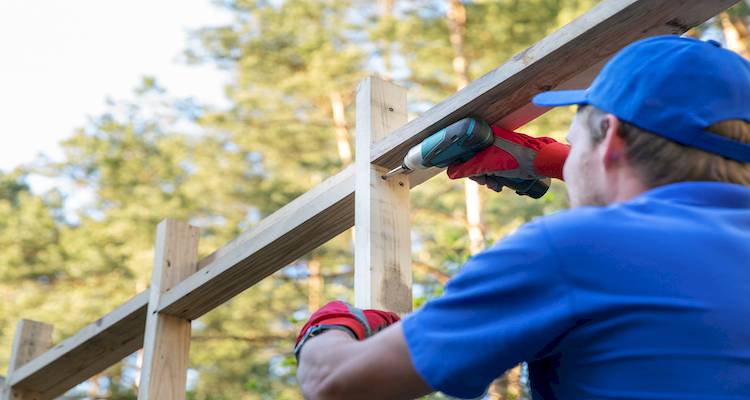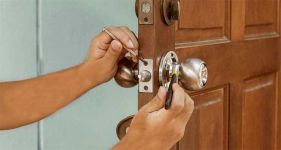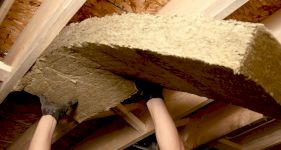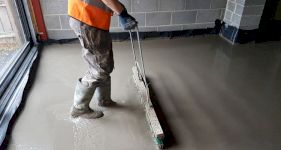How to Fit Curtain Poles
The article below provides you with a step-by-step guide on how to fit curtain poles. We will also go over all of the tools, materials, and safety equipment needed when it comes to curtain pole fitting.

Table of Contents
What Tools Do I Need to Fit Curtain Poles?
To ensure your curtain poles are fitted correctly, you need the right tools for the job. The list below highlights all of the relevant tools that you will need to fit curtain poles:
- Step ladder
- Tape measure
- Screwdriver
- Pencil
- Spirit level
- Drill
- Pipe and wire detector
What Safety Equipment Do I Need to Fit Curtain Poles?
Below is a list of safety equipment that you will need when fitting a curtain pole:
- Safety mask
- Safety goggles
When using step ladders as part of the job, these should be high enough so that you can work comfortably without having to balance or overreach.
What Materials Do I Need to Fit Curtain Poles?
Below is a list of the materials that you will need to fit curtain poles in your home:
- Tiebacks
- Screws
- Curtain rail
- Brackets
- Curtains
There are several types of curtain poles to choose from, including:
Wooden Curtain Poles
Wooden curtain poles are one of the most popular options and can be found in most homes across the UK. Wooden curtain poles are usually available in white and natural wood shades.
They offer a neutral and simple appearance which looks great with any curtain designs, including eyelet, pleated and tab top options.
Metal Murtain Poles
Metal curtain poles are also a common choice; however, they tend to offer a more contemporary design than wood curtain poles. They are also available in a variety of finishes such as chrome, brushed steel and matte black.
You can also add a range of finials to the end of the poles including metal balls, crystals and swirled fixtures.
Curtain Tracks
Curtain tracks are extremely versatile as they be used in limited spaces or over larger installations such as bay windows. These curtain poles are typically made from a durable plastic track which holds up curtains without the need for hook connections.
In contrast to the above curtain poles, they tend to be fitted closer to the wall so may not allow as much light in. They are also only compatible with pleated curtains, so it may not be the best option for other curtain styles.
Corded Curtain Tracks
Corded curtain tracks feature a pull cord which usually hangs beside the curtain, so it is easy to reach. This will enable you to open and close the curtains quickly and easily.
Before purchasing corded curtain tracks, you should check that they work with your chosen curtains and hooks.
It is also essential that you select curtain poles that work with your curtains. To help you make the right decision, take a look at the following curtain types:
Eyelet Curtains
This curtain style is one of the most popular designs in UK homes, with various options to choose from in terms of colours and patterns.

This type of curtain features rings at the header which work well with cotton and linen fabrics which makes them easy to open and close.
Casement Curtains
Casement or rod pocket curtains featured a ruched design which is created by sewing the pocket at the top of the curtains. This type of curtain holds lightweight materials such as cotton, linen and polyester.
Tab Top Curtains
Tab top curtains offer a luxurious finish with loops at the top edges of the curtains. This type of curtain is normally stable as rods tend to make it harder for them to open and close.
Pleated Drapes
If you are looking for a traditional curtain design, you may want to consider pleated drapes which offer a retro aesthetic. The pleated design is created by sewing header tape into the back of the curtain panel, which forms pleats when pulled together.
How to Prepare for Fitting Curtain Poles
To prepare for hanging a curtain pole, you will need to measure and mark out where your curtain pole is going to hang.
You want to measure the curtain pole height according to the height of your curtains.
The curtains may be to the floor, or just below the window, and it is essential to factor in the measurement where the curtain eyelets will be. This will help you to determine how high up your pole needs to be. The pole should be at least 50mm above the top edge of the window gap.
The ends of the pole should be at least 50mm either side of the window, or longer if you have thick curtains.
How to Fit Curtain Poles Yourself - Step by Step Guide
Below is a guide on how to fit curtain poles. It’s important to note that every home has different windows, and everyone has different curtain preferences. So, with that in mind, the steps below are simply a guide that you can adapt to your own circumstances.
Step 1
If your curtains are heavy or if you have a large window, you will need to put up a central bracket. To find your centre point, measure the entire length of the window and then half that amount and mark the centre point.

You also need to determine the height by measuring the drop. When doing this, make sure to mark your centre point at the appropriate height as required for your curtains.
Step 2
Before drilling a hole for your bracket, you need to make sure there are no cables or pipes behind the wall. Do this by running a detector over the wall area.

Step 3
Once you’re sure the wall is clear of any pipes or cables, put on a dust mask and safety goggles.

Step 4
After putting on your safety goggles and dust mask, you can then drill a hole through your centre marking and insert a wall plug into the gap.

Step 5
Then, place your screw into the wall plug and screw it almost all the way in but not fully. You need to leave enough space to put the bracket on to. If your bracket requires a second screw to secure it in place, screw this in now too.

Step 6
Measure the gather on your curtains and then mark out the measurement for your curtain gather on the wall. For example, if your curtain gather is 100mm. Put a mark 100mm to the right of the window gap.

Use your centre bracket as a guide and make sure the mark is in line with it. Use a spirit level to ensure it is completely level with the centre bracket.
Step 7
Once you’re sure your marking is in the right place, attach your right-hand bracket in the same way as the centre bracket.

Step 8
You can then repeat this same process on the left-hand side.

Step 9
You will now need to feed your curtain pole through the curtains and then lift it into position. Make sure that you leave the end eyelet on the outside of the bracket.

Step 10
Repeat this same process on the other side, and you can then secure your curtain pole into position on the brackets using the screws provided.









